Enterprise AI Platforms: Benefits, Risks & Top Tools in 2025
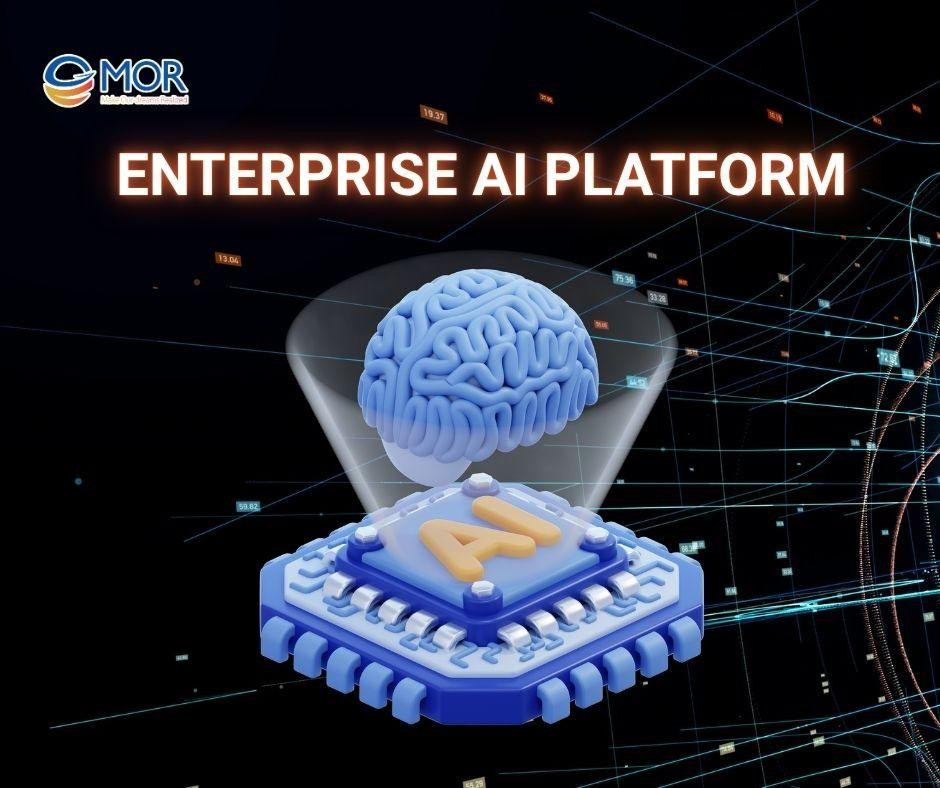
Is your business truly ready for AI? In today’s digital era, adopting an enterprise AI platform is no longer optional — it has become a strategic imperative to accelerate innovation and maintain a competitive edge. This article provides a comprehensive overview of the leading B2B AI platforms, helping organizations make informed decisions and stay ahead of the trends shaping the future of enterprise AI.
What Is An Enterprise AI Platform?
An Enterprise AI Platform is an artificial intelligence platform specifically designed for large-scale business environments. It deeply integrates with existing enterprise systems and supports long-term strategic objectives.
Unlike traditional AI tools that focus on solving a single, isolated task, enterprise AI platforms offer a comprehensive ecosystem to develop, deploy, manage, and scale AI models across the entire organization.
The table below highlights the key differences between enterprise AI platforms and traditional AI tools:
Criteria | Traditional AI Tools | Enterprise AI Platform |
Deployment Scope | Limited to a specific function or department | Organization-wide, cross-functional deployment |
Scalability | Struggles with large-scale or complex data loads | Built for scalability and high data throughput |
System Integration | Minimal or isolated integration | Deep integration with ERP, CRM, SCM, and enterprise systems |
Security & Compliance | Lacks governance, audit trails, or role-based access | Enterprise-grade data governance and access control |
Continuous Learning | Requires manual updates and retraining | Learns from continuous data flows and improves over time |
Infrastructure Architecture | Typically, on-premise or standalone | Supports multi-cloud, edge computing, and microservices-based architecture |
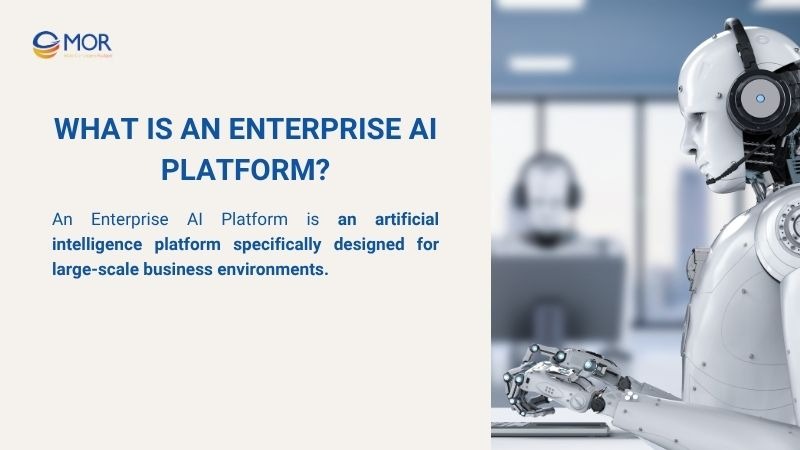
What Is An Enterprise AI Platform?
Key Benefits Of Adopting An Enterprise AI Platform
Implementing an enterprise AI platform is no longer a futuristic move—it's a strategic necessity for digital-first organizations. Below are the key benefits that enterprise leaders are realizing
Boosting Operational Efficiency and Productivity
Implementing an enterprise AI platform enables organizations to automate a wide range of repetitive workflows. Instead of relying on employees to perform time-consuming and error-prone manual tasks, the AI platform replaces them with intelligent processes that continuously learn and optimize in real time.
For example, many retail enterprises use enterprise AI platforms to process thousands of orders daily, analyze real-time data, and coordinate logistics operations dynamically, without the need for manual intervention.
Beyond automation, the AI platform also acts as a strategic assistant. These platforms help employees save time and focus on higher-value tasks that require creativity, judgment, and strategic thinking.
Enhancing Customer Experience With AI
One of the most significant benefits of using enterprise conversational AI platforms is their ability to deliver seamless customer experiences. No longer fully dependent on support staff, AI systems can handle thousands of conversations simultaneously.
They generate intelligent, contextual responses and continuously learn from each interaction to improve over time. According to aggregated data from ZipDo, 74% of consumers prefer interacting with AI bots due to instant responses.
As a result, businesses leveraging enterprise AI platforms can build detailed customer profiles, predict upcoming needs, and personalize messaging across different segments.
Reducing Operational Costs
In addition to boosting productivity, enterprise AI platforms deliver clear financial benefits. They significantly reduce errors, optimize resource allocation, and shorten processing times. According to a survey by Coworker.ai, companies that implement AI-driven process automation typically see a 20–30% reduction in operational costs.
By automating repetitive workflows, businesses can lower staffing expenses while also minimizing errors caused by manual handling. This is one of the leading contributors to operational inefficiencies and hidden losses.
Gaining A Sustainable Competitive Advantage
Enterprises that make faster, more accurate decisions and adapt swiftly to change are the ones that lead their markets. Investing in a leading digital ops AI platform for enterprise is a strategic move to unlock this competitive edge.
Modern enterprise AI platforms can analyze millions of data points to generate instant decision-making insights. This level of agility and responsiveness is nearly impossible to achieve manually.
For example, a fashion brand leverages an enterprise AI platform to monitor search trends, analyze shopping behavior on social media, and track in-store sales data in real time. When a new fashion trend emerges, the AI system automatically recommends design updates, forecasts demand by region, and optimizes the supply chain within hours.
While competitors are still gathering reports and conducting manual meetings, this brand is already launching trend-driven products to market 5–7 days earlier.
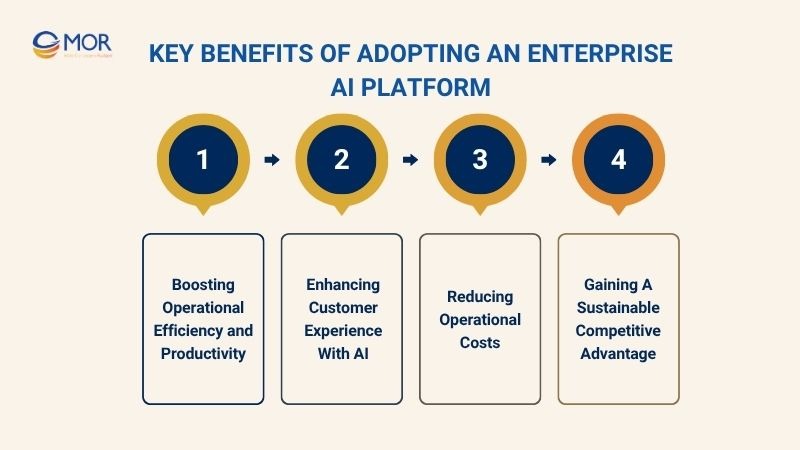
Key Benefits Of Adopting An Enterprise AI Platform
6 Core Capabilities Every Leading Enterprise AI Platform Should Have
As enterprise AI adoption matures, not all platforms are created equal. The following seven capabilities are essential for building a future-ready enterprise AI platform that supports long-term transformation and competitive advantage.
Enterprise-Wide Data Aggregation
One of the core strengths of modern enterprise AI platforms is their ability to aggregate and integrate data across all business units. This unified data view helps eliminate silos and gives enterprises a clearer picture of operations, customers, and resources—enabling smarter, AI-driven decisions.
Example: Global Retail Conglomerate
A global retail conglomerate implemented an enterprise AI platform to aggregate data from:
- CRM systems track regional customer behavior
- ERP systems log inventory levels and supply chain operations
- IoT devices monitor real-time in-store foot traffic
- Customer feedback across email, chatbots, and social media
Previously, these systems operated in silos, and data was fragmented, requiring manual consolidation. With the enterprise artificial intelligence platform in place, the company can now:
- Forecast regional product demand within hours
- Optimize inventory using weather data and purchase behavior
- Automatically trigger marketing campaigns tailored to customer segments
- Generate early warnings for potential stockouts or supply chain disruptions
Multi-Cloud Support and Persistent Data Storage
A high-performing enterprise AI platform must operate seamlessly across multiple cloud environments. This includes AWS, Microsoft Azure, Google Cloud, or even private cloud infrastructures. Multi-cloud capability allows enterprises to avoid vendor lock-in, optimize operational costs, and maintain high system availability.
Edge Computing Capabilities
In sectors such as manufacturing, logistics, healthcare, and IoT, relying solely on cloud processing can create unacceptable latency. That’s why modern enterprise AI platforms are increasingly equipped with edge computing capabilities, allowing data to be processed directly at the endpoint.
Example: In a smart factory, a leading enterprise AI platform is deployed on edge devices to monitor machinery in real time. If a sensor detects abnormal vibration, the AI model can immediately identify it as a potential failure and trigger a predictive maintenance alert, without needing to route data through the cloud.
Enterprise Semantic Modeling
One key differentiator of enterprise AI platforms is their capacity to understand business-specific semantics. Rather than treating data as raw values or isolated entries, a true enterprise artificial intelligence platform must take context into account.
This means building semantic models, also called “ontologies”, to capture how data is understood within specific departments, processes, or business areas. AI to move beyond simply “reading” data to truly “understanding” it in context.
For example, the term “contract” can have different meanings depending on the business unit:
- In accounting, it may represent a financial obligation or receivable.
- In law, it refers to a binding document with specific rights and responsibilities.
- In sales, it marks the successful closing of a deal.
Scalable Enterprise Microservices Architecture
A leading digital ops AI platform for enterprise must be built on a scalable microservices architecture. This means that each function within the platform is designed as a lightweight, independent service that can be maintained, updated, or scaled without disrupting the entire system. This modular approach enables enterprises to deploy and upgrade various components of the AI platform according to their evolving needs.
Enterprise Data Governance And Security
Data is one of the most strategic assets in any modern organization. When deploying an enterprise AI platform, ensuring robust security, compliance, and access control becomes a top priority.
A leading AI platform for enterprise must implement strong data governance policies. According to a report by Cloudera, 53% of organizations cite data privacy as the biggest barrier to adopting AI agents. This underscores the critical need for compliance with global data protection standards such as GDPR, HIPAA, or ISO/IEC 27001.
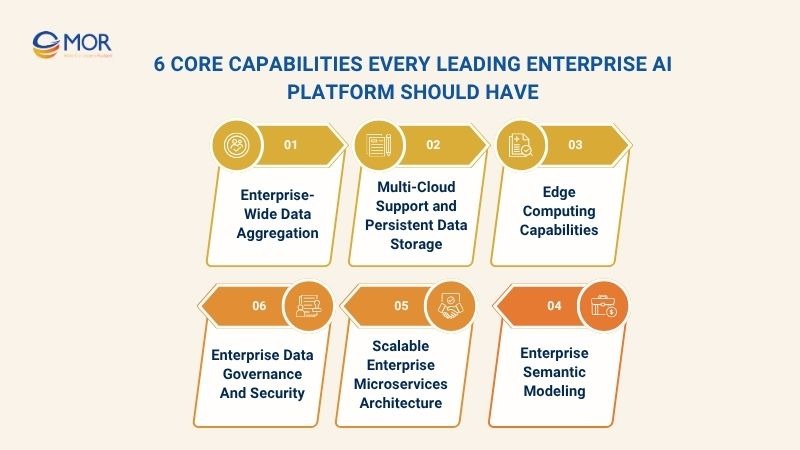
6 Core Capabilities Every Leading Enterprise AI Platform Should Have
Top 9 Enterprise AI Platforms In The Market Today
Choosing the right enterprise AI platform can be a game-changer for organizations aiming to scale AI across their business functions. With the market growing rapidly, enterprises are now faced with a wide range of options, each offering unique strengths, integration capabilities, and industry use cases.
Amazon SageMaker
Amazon SageMaker is a fully managed machine learning platform designed to accelerate the development and deployment of enterprise-grade AI solutions. Built on the robust infrastructure of AWS, SageMaker streamlines the entire ML workflow while ensuring high security, automation, and scalability across global environments.
Key Features:
- Supports the full ML lifecycle: data processing, labeling, training, deployment, and monitoring
- Built-in high-performance algorithms
- MLOps tools like SageMaker Pipelines and Model Monitor
- Flexible scalability across AWS infrastructure
- Bring Your Model (BYOM) deployment support
Pros:
- Scales seamlessly with large datasets
- Fully integrated with the AWS ecosystem
- Flexible, pay-as-you-go pricing model
Cons:
- Requires technical expertise to unlock full potential
- Risk of vendor lock-in if not using open architecture
Ideal For: Enterprises already using AWS or seeking a highly secure and scalable enterprise AI platform for mission-critical applications.
Databricks
Databricks is a unified enterprise AI and data analytics platform designed for big data processing and enterprise-level AI/ML development. Built on Apache Spark, it supports data-centric AI workflows and real-time analytics.
Key Features:
- Delta Lake for batch & streaming data with high consistency
- MLflow for full ML lifecycle management
- Real-time data processing and predictive analytics
- Collaborative notebooks with support for SQL and Python
- Multi-cloud integration: AWS, Azure, Google Cloud
Pros:
- Fast, efficient processing of massive datasets
- Strong MLOps and model management features
- Enables team collaboration across data science and engineering
Cons:
- May be overkill for simple AI use cases
- Can become expensive without proper resource optimization
Ideal For: Enterprises with large-scale data operations and multiple data teams needing a centralized, scalable enterprise artificial intelligence environment.
DataRobot
DataRobot is an enterprise AI platform focused on automated machine learning (AutoML), allowing organizations to quickly build and deploy models without deep technical expertise. It’s ideal for low-code/no-code enterprise AI implementation.
Key Features:
- End-to-end AutoML: from data prep to algorithm selection and model evaluation
- Automatic feature discovery and pipeline optimization
- Explainable AI for transparency and compliance
- Fast deployment across cloud and on-prem environments
- Built-in model performance and risk monitoring
Pros:
- Accelerates AI adoption with minimal technical overhead
- Reduces operational risks with built-in governance tools
- Intuitive interface for business and technical users alike
Cons:
- Limited customization for complex use cases
- Licensing costs can be a barrier for some organizations
Ideal For: Mid-to-large enterprises looking to deploy enterprise artificial intelligence rapidly without building in-house data science teams.
Google Cloud Vertex AI
Vertex AI is Google Cloud’s enterprise AI platform, offering a comprehensive toolset for model building, training, deployment, and monitoring—all within a cloud-native environment.
Key Features:
- Deep integration with BigQuery, Looker, and other Google Cloud services
- Vertex AI Workbench unifies ML workflows and data access
- Combines AutoML and custom model training
- Built-in MLOps features with support for CI/CD pipelines
- Serverless prediction and model versioning
Pros:
- Optimized for enterprises already using Google Cloud
- Superior data integration capabilities
- Easy scalability in multi-cloud environments
Cons:
- It can be complex for beginners
- Works best when fully committed to the Google Cloud ecosystem
Ideal For: Organizations using Google Cloud infrastructure or those needing an AI platform for enterprise applications with strong MLOps and analytics integration.
Microsoft Azure AI
Azure AI is Microsoft’s enterprise AI platform, offering a full suite of AI tools from cognitive APIs to infrastructure for developing and deploying AI at enterprise scale.
Key Features:
- Azure Machine Learning Studio for model development and lifecycle management
- Cognitive Services: APIs for vision, language, speech, and decision-making
- Azure OpenAI Service: access to large language models (LLMs)
- Enterprise-grade security via Azure Active Directory
- Seamless integration with Microsoft 365, Power BI, and Dynamics 365
Pros:
- Strong enterprise integration with Microsoft workflows
- Meets high-level security and compliance standards
- Supports hybrid deployment (cloud + on-premise)
Cons:
- May require DevOps expertise at scale
- Some services are restricted by region
Ideal For: Enterprises using Microsoft’s ecosystem looking to embed enterprise artificial intelligence into their existing business applications and workflows.
H2O.ai
H2O.ai is a renowned open-source enterprise AI platform known for its advanced AutoML tools and high-performance data processing. It is widely adopted in industries like finance, insurance, and healthcare, where AI transparency and regulatory compliance are critical.
Key Features
- H2O Driverless AI: powerful AutoML for both experts and non-technical users
- Built-in explainable AI (XAI), bias detection, and regulatory compliance tools
- Compatible with Python, R, Spark, and other major frameworks
- Easy deployment via REST APIs and containerization
- Strong in time-series forecasting, risk analytics, and fraud detection
Pros
- Strong open-source community and extensive documentation
- Cost-efficient licensing due to open-source model
- Suitable for complex and regulated AI use cases
Cons
- Less intuitive UI compared to commercial platforms
- Requires programming skills without Driverless AI
Ideal For: Large organizations in finance, healthcare, and insurance needing enterprise artificial intelligence solutions with transparency, regulatory compliance, and high-performance AutoML.
Dataiku
Dataiku is an end-to-end enterprise AI platform that empowers both technical and business users to collaboratively build, train, and deploy AI models. It is designed to support scalable AI projects with governance, reusability, and cross-functional collaboration at its core.
Key Features
- Visual interface combined with full-code flexibility
- Pipeline management for both data and ML workflows
- MLOps support including CI/CD, model monitoring, and drift detection
- Integrates with Spark, Hadoop, Snowflake, cloud platforms, and more
- Automates data preparation and model training tasks
Pros
- Enables both technical and non-technical user collaboration
- Strong governance and access control for multi-team environments
- Reduces coding dependency with visual pipelines
Cons
- An enterprise license may be costly
- Overkill for smaller businesses with basic AI needs
Ideal For: Large enterprises with multiple departments seeking to deploy enterprise AI platforms through a collaborative, scalable, and governed approach.
C3.ai
C3.ai is an enterprise-grade AI platform purpose-built for large-scale digital transformation across industries. Known for its rapid deployment capabilities and pre-built AI applications, it serves sectors like manufacturing, energy, finance, and oil & gas.
Key Features
- Over 40 pre-built AI applications tailored to industry use cases
- Powerful enterprise data integration engine
- Real-time AI model deployment and decision support
- Strong capabilities in predictive maintenance and supply chain optimization
- Trusted by global corporations like Shell, 3M, and Enel
Pros
- Optimized for complex industrial and regulated sectors
- Faster time-to-value through pre-configured solutions
- Strong in AI operationalization (AI + Ops)
Cons
- Most effective for very large-scale enterprises
- High deployment costs and reliance on C3.ai consultancy
Ideal For: Industrial and large-scale enterprises requiring a ready-to-deploy enterprise AI platform optimized for specific industry use cases and operational efficiency.
IBM Watsonx
Watsonx is IBM’s next-generation enterprise AI and data platform, building on the legacy of IBM Watson. It emphasizes responsible AI, large language model (LLM) training, and enterprise-grade data governance, all within a hybrid-cloud architecture.
Key Features
- Watsonx.ai: studio for training and deploying LLMs
- Watsonx.data: hybrid lakehouse architecture for enterprise-scale data
- Watsonx.governance: AI lifecycle control and compliance tools
- Supports deployment on hybrid cloud and mainframe environments
- Integrates with Red Hat OpenShift, SAP, Salesforce, and more
Pros
- Designed for responsible AI with transparency and fairness
- Strong governance features for regulated industries
- Leadership in foundation model development and enterprise trust
Cons
- Implementation can be complex and time-consuming
- UI may be less intuitive for new users
Ideal For: Large organizations in finance, healthcare, and public sectors that require enterprise AI platforms with rigorous data governance, model transparency, and regulatory compliance.
Platform | AI Democratization Level | Industry Readiness (Use-case Fit) | Governance & Compliance Strength | MLOps Maturity | Open Ecosystem Integration |
Amazon SageMaker | Medium | High–suited for scalable ML in cloud-heavy ops | High | Advanced | Strong in the AWS ecosystem only |
Databricks | Medium | High – Ideal for data-driven AI & analytics | Medium | Advanced | Strong multi-cloud & Spark-native |
DataRobot | High | Medium – Best for AutoML and quick POCs | Medium | Intermediate | Moderate; more closed AutoML focus |
Google Vertex AI | Medium | High–suited for cloud-native, big data use cases | High | Advanced | Deep GCP integration, moderate outside |
Microsoft Azure AI | Medium | High – Fits enterprise workflows well | Very High | Advanced | Strong in the Microsoft ecosystem |
H2O.ai | High | High – Strong in finance, healthcare | High | Intermediate | Very strong in open-source & API-first |
Dataiku | Very High | Medium – Flexible for cross-functional teams | Medium | High | Strong on multi-cloud and 3rd party |
C3.ai | Low | Very High – Industry-specific, pre-built apps | Very High | Advanced | Moderate; focused on C3 stack |
IBM Watsonx | Medium | High – Best for regulated industries | Very High | High | Moderate with enterprise software |
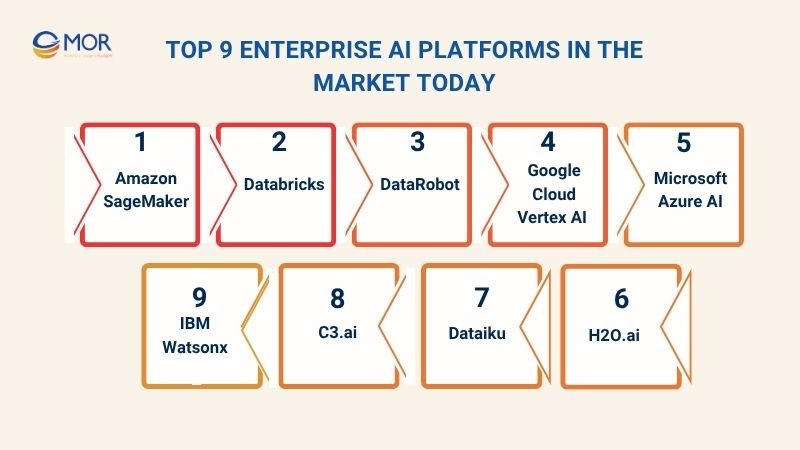
Top 9 Enterprise AI Platforms In The Market Today
Challenges And Risks Of Enterprise AI Platform Implementation
Despite the growing adoption of enterprise AI platforms, many organizations still struggle to unlock their full value due to various implementation challenges. Understanding these obstacles is essential to ensure a successful, secure, and sustainable AI transformation.
Poor Planning and Skill Gaps
Many organizations embark on AI initiatives without a clear long-term strategy, resulting in fragmented efforts that fail to deliver meaningful business value. This lack of direction often leads to siloed pilot projects that never scale or align with enterprise goals.
In addition, AI skill gaps remain a major barrier to successful enterprise AI deployment. The shortage of qualified professionals in data science, MLOps, and cloud AI architecture makes it difficult for companies to build, operate, and scale AI systems effectively.
While 81% of IT professionals claim confidence in AI, only 12% possess the actual skills required to implement AI solutions professionally.
Employee Distrust and Resistance to AI Adoption
Deploying enterprise AI platforms is not solely a technological challenge; it’s also a deeply human one. Many AI initiatives fail not because of technical shortcomings, but due to internal resistance from employees who distrust or actively oppose the introduction of AI into their workflows.
According to Kyndryl’s 2025 report, 45% of CEOs acknowledge that a majority of their employees exhibit resistance or even open hostility toward AI adoption. This friction often stems from fears of being replaced, uncertainty about how AI works, and skepticism about the fairness and accuracy of AI-generated outcomes.
Unintentional Bias in AI Models
One of the most common risks when implementing an enterprise AI platform is the presence of unconscious bias in training data. Historical data often reflects societal stereotypes or legacy decision-making patterns within organizations. If not carefully audited, enterprise AI systems can easily learn and amplify these existing biases.
A clear example is in AI-powered recruitment systems. If the platform is trained on past hiring data where the majority of successful candidates were male, the AI model may unconsciously favor male applicants. As a result, it might rank female candidates lower, even if they have equal qualifications.
Lack of Explainability in AI Outputs
Many enterprise AI models today operate as a “black box”: the system generates results, but it’s difficult to understand how or why specific decisions are made. This lack of transparency creates significant barriers in highly regulated industries such as finance, healthcare, and the public sector.
When an enterprise AI platform cannot explain the reasoning behind its outcomes, users lose trust, and managers face challenges in auditing or defending decisions. That’s why modern enterprise AI platforms must prioritize AI explainability, the ability to interpret and communicate the logic behind model predictions and decisions.
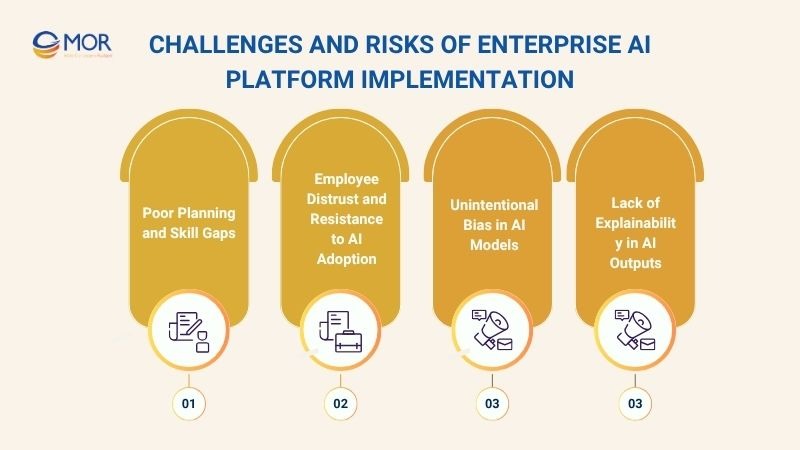
Challenges And Risks Of Enterprise AI Platform Implementation
What’s Next For Enterprise AI Platforms?
Shortly, enterprise AI platforms will evolve into the core infrastructure layer powering the entire operational ecosystem of modern businesses. Much like the internet in the 2000s or cloud computing in the last decade, AI will become deeply embedded in every process, from data governance and task automation to predictive analytics and personalized user experiences.
One emerging trend is the convergence of enterprise AI with other next-gen technologies such as IoT (Internet of Things), blockchain, and low-code/no-code development platforms. AI will no longer operate in silos but will integrate seamlessly with digital ecosystems. According to Gartner, 70% of new enterprise applications will be developed using low-code or no-code tools by 2025, highlighting how enterprise AI is shifting toward agility and accessibility.
Looking ahead, AI models will become more self-optimizing and hyper-personalized. With continuous real-time data inputs, AI systems will be able to learn and adjust autonomously, fine-tuning parameters to deliver more accurate insights without manual intervention.
McKinsey reports that 92% of enterprises plan to increase their AI investments over the next three years, reinforcing the view that AI is no longer a side initiative but a primary engine for enterprise growth.
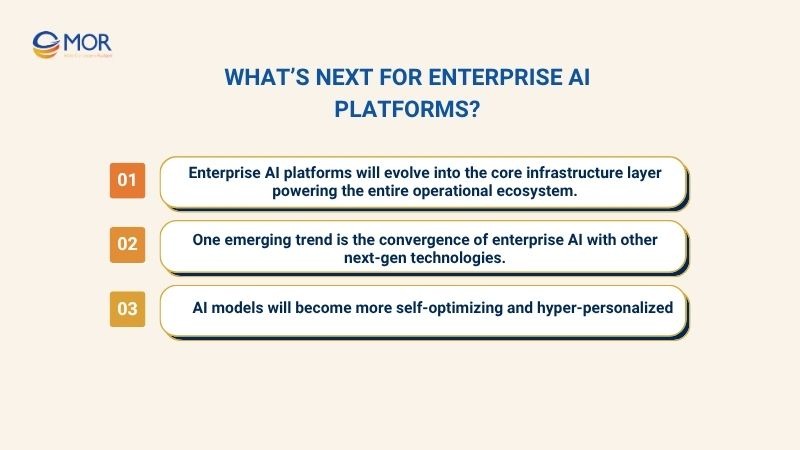
What’s Next For Enterprise AI Platforms?
In conclusion
Despite ongoing challenges, enterprise AI platforms are increasingly proving to be a central driver in the digital transformation of B2B businesses. Choosing the right platform, backed by a clear strategy and a capable team, is the key to long-term success. Don’t miss the opportunity to harness the full potential of AI — now is the time for your organization to embark on its AI journey with intention and control.
MOR SOFTWARE
Frequently Asked Questions (FAQs)
What criteria should businesses use to choose the right Enterprise AI platform?
They should look at enterprise-wide data integration, multi-cloud support, strong security, scalability, and ease of use for both technical and non-technical teams.
Can small and medium-sized businesses (SMBs) adopt Enterprise AI platforms?
Yes. Many platforms offer flexible pricing, SaaS deployment, and low-code/no-code tools that make them accessible to SMBs with limited resources.
How can companies overcome employee skepticism toward AI?
By clearly communicating AI’s role as a support tool, offering internal training, and using platforms with explainable AI capabilities to build trust.
Do Enterprise AI platforms help with regulatory compliance?
Yes, especially those with robust data governance, access controls, and auditability, crucial for regulated industries like finance or healthcare.
What are the common pitfalls when implementing Enterprise AI platforms?
Lack of strategic planning, internal skill gaps, and biased data are major risks. These can be mitigated with long-term planning and choosing platforms with strong governance and transparency features.
Rate this article
0
over 5.0 based on 0 reviews
Your rating on this news:
Name
*Email
*Write your comment
*Send your comment
1